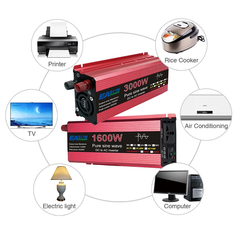The Ultimate Guide to Choosing a Versatile Pure Sine Wave Inverter for Multiple Power Sources
Corps
Understanding Pure Sine Wave Inverters
When it comes to powering your electronic devices or appliances off-grid, a pure sine wave inverter is essential. These inverters produce a smooth and consistent electrical output that mimics the power from the grid, making them suitable for sensitive equipment like laptops, TVs, and medical devices.

Benefits of Using a Pure Sine Wave Inverter
One of the key advantages of a pure sine wave inverter is its ability to run a wide range of devices without causing any damage. Unlike modified sine wave inverters, pure sine wave inverters can handle both resistive loads (like heaters) and inductive loads (like motors) efficiently.
Factors to Consider When Choosing a Pure Sine Wave Inverter
When selecting a pure sine wave inverter for multiple power sources, there are several factors to keep in mind:
Power Output
Consider the total wattage of the devices you plan to power simultaneously. Choose an inverter that can handle the peak power demands of your equipment to avoid overloading the system.
Input Voltage
Ensure that the inverter can accept input from various power sources, such as solar panels, batteries, or generators. This versatility allows you to switch between power sources seamlessly.
Battery Capacity
Match the inverter's power output with the capacity of your battery bank. A larger battery capacity will provide longer run times during power outages or when off-grid.
Waveform Quality
Opt for a pure sine wave inverter to guarantee a clean and stable power supply for your sensitive electronics. This waveform quality is crucial for the proper functioning and longevity of your devices.
The Ultimate Guide to Installing a Versatile Pure Sine Wave Inverter for Multiple Power Sources
Once you have selected the right pure sine wave inverter for your needs, the next step is installation. Follow these steps for a successful setup:
- Locate a well-ventilated area for the inverter to prevent overheating.
- Connect the inverter to the battery bank using the appropriate cables and fuses.
- Ensure proper grounding to protect against electrical faults.
- Test the inverter with different power sources to verify compatibility.
By following these installation guidelines, you can enjoy a reliable and versatile power supply for your various devices and appliances.
Conclusion
Choosing a versatile pure sine wave inverter for multiple power sources is a crucial decision for anyone looking to power their equipment off-grid. By considering factors like power output, input voltage, battery capacity, and waveform quality, you can select the right inverter for your specific needs. Remember to follow proper installation procedures to ensure optimal performance and safety.






commentaires